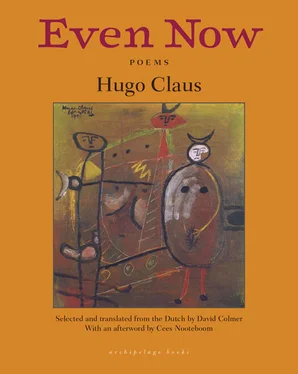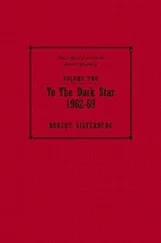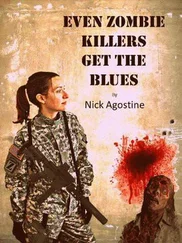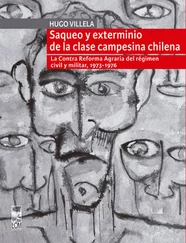where you shrink. For all that the taste
of almond still shakes you up,
as much as you’re an ape in your delusions,
you here on three legs, give up the fight
and say goodnight to your children.
A seagull is already skimming the sea
to catch you up with salt and sand.
When the news came — no news came.
We drilled to the stream’s grave and carved
through the hyacinths that smothered its bed
when the news came.
And the news, translated and suppressed, pierced our chests
and broke the already motionless rock in our crotch.
It was a judgement on our customs,
a white law, scarcely explained:
“No more fumes, no pipes, no powders or herbs,
no sniffing or sucking the life-giving grass.”
Then we sat down and became the slush
in the sludge of the dredging machines.
With transplanted brains, banished to the blood-sapping cold,
we sat down by the foreign sea.
Strangled our parents with their queues, hung our children
in a bunch from the crane
and waited under the buzzards for the surging tide
to catch us in its cloud-sown waves.
Message to the Population [1962]
(an appeal in an extremely free verse form, delivered at Amsterdam’s Krasnapolsky Hotel on 1 January 1962, and dedicated to two of those present: Remco Campert and Simon Vinkenoog)
My very dear friends,
Sometimes I tell a story (as one might expect of a poet)
About the winter which, in the white night,
Sends a flock of seagulls over the besieged city.
And then you nod, “Right, that’s a poet talking.”
And if in a romance I wish to record
The lamentations of the people in their gardens
You whisper, “Sure.”
Because I say so, because I am a poet.
But if I say, “Soon a gigantic wind will blow over you all,
A gruesome wind from God
And nothing will be left of any of you,”
Then you splutter and say, “He is a poet.”
(I.e., he should concern himself with books and broads,
but not with the delicate, fundamental, incalculable
cogs and wheels of politics and the intricate swinging system
of left and right, for and against, red or dead.)
My very dear friends,
On this winter’s day, the first of the year 1962,
There is much that I love, including, for example,
My wife, my three brothers, my father and my mother,
And there is much that I abhor, including, for example,
Those who have a lot of money when I have too little,
Writers who write badly and women without necks.
Well, of what I cherish and what I hate,
There will soon, after that wind, be nothing left.
Friends, God came to me and said,
“Claus, I made you out of nothing, what do you think of that?”
And I said, “Thank you very much, God.”
And he said, “And to nothing you will return. Huh?”
And I said, “Thank you very much, God. Just say the word.”
But then a man came up to me and said,
“I’d rather be dead than red,
And if I want to die then so do you.
I’d rather be one hundred per cent dead than just a little bit red.
All hands on deck, our ship will never sink.
None of us will ever be even a little bit pink!”
And I said, “Thanks a lot, man, but I pass.”
And he said, “Wars ennoble when they are noble wars,
fought for freedom’s holy cause.”
Then I said, “Thanks a lot, man, but I pass,
Because what’s going to come is no war
But a single gruesome, obscene wind from your God
And after that, nothing else.”
And I said, “I don’t want to see your God’s arse.”
Nothing else after that? Will all our eyeless
Toothless, chickenless grandchildren slough off
Their blistered skin down to the sixteenth toe?
Where in the blackest night does a blind man see a lighter black?
I hope that the gentlemen *
Will be able to explain that to you shortly.
I already know it all too well (I am a poet)
And it sickens me to realise
How I am making a fool of myself.
Because how can I make a fist?
One officer with a regulation truncheon
Would take care of the brainwork in my head in a jiffy.
Let alone: 3 police officers and 2,000 soldiers. Let alone the
Millions who would rather be red than dead.
There’s nothing to be done about it, so I do nothing
Except say these words, which also do nothing,
To you who also do nothing.
Admit it, it’s insane.
Because anyone who’s not spent and bent from hope and despair
Isn’t sitting here
But waiting in their warm house with coffee and cake
And calculating which corner of the cellar
Is best for the construction of a better, double, crossways cellar,
For later. When the wind comes.
My very dear friends,
When that wind descends over you tomorrow
And you are taken up in Gods’ fart
What good will hope and despair do you?
Let us head homewards,
Because don’t you see how paltry brittle fragile
This peace is,
When someone like me argues about it
And someone like you and you and you and you
With spent bent words and nicely flammable
Banners and books.
That is why, dear friends, there will be
No message from me on the first day of the year,
But an announcement for the population .
This is the announcement.
Go home. Later on television there will be
The Tales of Hoffmann, Eurovision.
Watch it.
Afterwards, once you have digested your evening meal
And your thought processes are a little slower,
Sit down in front of your mirror,
Pull out your breadknife,
Hold it against your throat, and recite
The prayer of those who order and rule your days,
The prayer of your governments on earth,
Who are the bowels of God.
Our Father
Who art in Heaven
Blessed be Thy Bomb
Your Kingdom come
Your Megatons ignite here on earth
As they do in Heaven.
Give us this day our nuclear weapons
And forgive us our provisional peace
As we forgive those who annoy us by moaning for peace.
And lead us not into the temptation of disarmament
That we may incinerate and disappear
For ever and ever
Amen.
*At Krasnapolsky, the speakers after Claus were the clergyman Kater, the biologist Van der Lek, the teacher H. Herbers and councillor Van der Sluis-Fintelman.
from Peripheral Poems to L’Inferno , Canto XIII [1962]
Where are you going? Why? Hollow questions, these,
and perfectly suited to fathers and judges!
We danced around their questions, spinning, swish, swish,
we, perfectly vacuous, we, ornate dolls.
“Just don’t get us pregnant!” the girlies screeched
and the menfolk held back meekly
between a squeal and a bounce, and a pounce.
Oh no, nowhere on earth
did we feel more at home
than under the maddest of skirts.
But God sent down a surly aviator
to sprinkle his ingredients among us:
virtues, wrinkles, solitude.
The nights grew older and longer.
And then, without a sign or word, a grumbling verdict
was passed. That’s right! Justice could be done!
How else can we explain that we
unnecessarily, improbably, unjustly,
were dancing slowly by the sea?
Now often, when the evening falls like snow,
a thing or creature moves towards us. And it
Читать дальше












